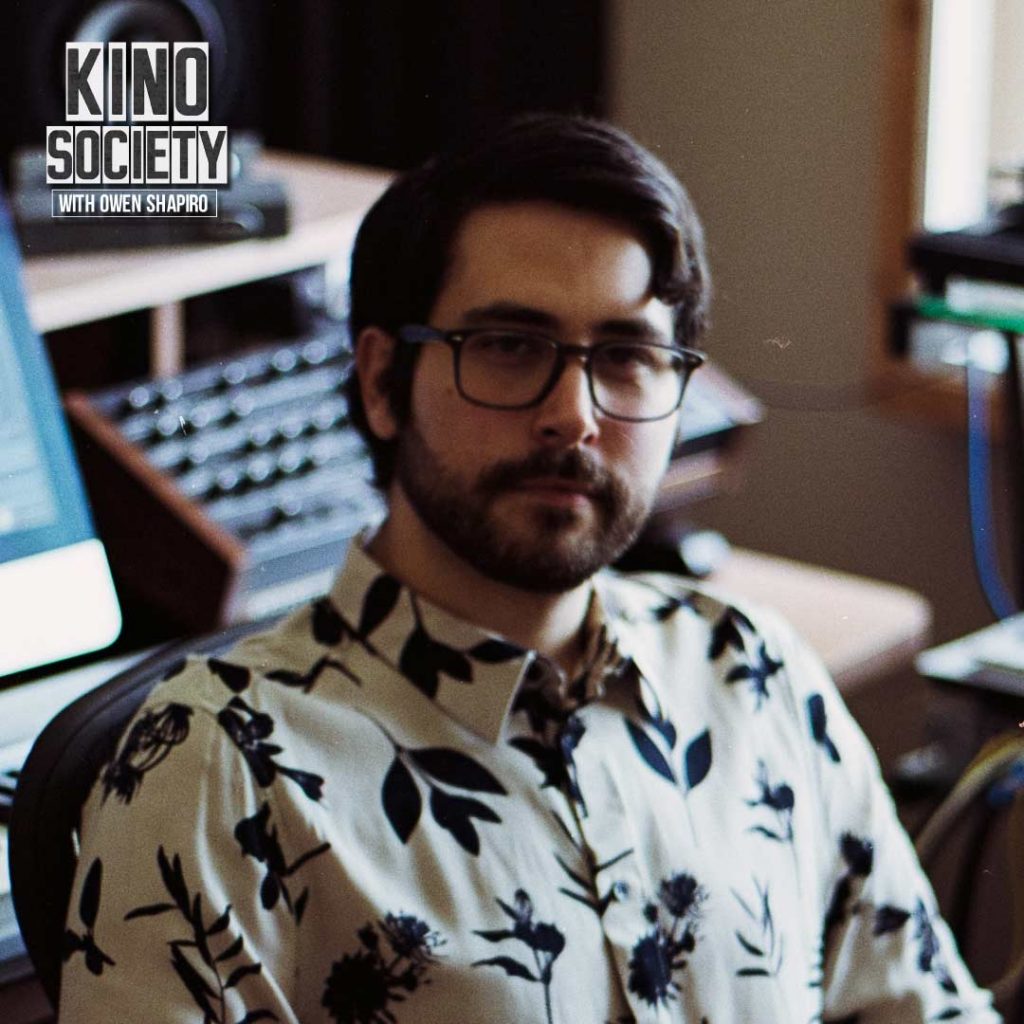School of Music: Creating a Movie’s Musical Story with Film Composer, Gavin Brivik
Owen Shapiro 00:04
Welcome to Kino Society with Owen Shapiro. In today’s episode, we have Gavin Brivik, a composer best known for his work on a Netflix original series Living Undocumented. The 90th Academy Award nominated film, My Nephew Emmett, and the Blumhouse Netflix original film Cam. Gavin is featured as one of the American Society of Composers and publishers film composers to watch and the winner of the 2017 world Soundtrack Award for Best composition by Young International Composer. Welcome to Kino Society, Gavin.
Gavin Brivik 00:46
Hey Owen, thanks for having me. Yeah, and thanks for the nice introduction. It’s, it’s awesome to just be a part of this, I saw some of your previous guests. And honestly, great lineup, a lot of great people, a lot of great departments. So thank you.
Owen Shapiro 01:04
Thank you so much. What made you want to be a composer? Um, well,
Gavin Brivik 01:09
I didn’t initially actually want to be a composer, I wanted to be like a touring guitarist, actually. And then I ended up injuring my wrist. So I wasn’t able to play guitar for a few years. And when I was in college, like music school, I had a roommate who was a composer. And, you know, I looked really cool. And I was always interested in writing, like, I did write on my guitar and wrote songs, but never really thought about writing, you know, classical music, contemporary music, electronic music. So the program I studied in, was like a great introduction and kind of helped me get all the tools and then later film composer came into the picture.
Owen Shapiro 01:54
So what music school did you go to?
Gavin Brivik 01:57
I went to the University of Missouri, Kansas City for my undergrad. And later, I went to NYU, but um, yeah, yeah, at UMKC. I studied just contemporary classical composition, which is, like, aired way more on an academic view of music. And then I kind of got burned out of that, and then ended up switching to film scoring,
Owen Shapiro 02:26
What is an average workday like for you?
Gavin Brivik 02:28
Um, well, I’m in the middle of one right now. Um, it kind of varies. Like, some, sometimes I take on like, one big project. So say, like, I’m working on a feature film or a series, you know, I, I kind of just have a set deadline set by the producers and the production. So you know, I get the film, and I’m just writing all day. And I try to create a routine out of it, or, you know, I, it’s kind of like just set, it’s, it’s actually not very sexual routine. And I should probably get better at that. But it’s just right. It’s just me and my studio all day, I was doing this like, pre pandemic. So it’s, you know, I’ve always just been kind of working alone in the studio all day.
Owen Shapiro 03:15
So COVID has not really changed much.
Gavin Brivik 03:18
I mean, it’s changed a lot, obviously, in in a lot of ways, but like, on a very minimalist aspect of like, working from home. I’ve always worked from home. And I’ve always worked like in my own studio. So that hasn’t changed. But obviously, like, the social aspects of getting work and meeting with like, I used to have directors and filmmakers come to my studio, and we would work have like a little couch in my studio for them to listen and kind of talk through things. So obviously, that is very different. And then obviously, not as much work just because of so many productions being shut down. But you know, I’ve always worked from home. So I guess that’s been the same.
Owen Shapiro 04:02
What project of yours is your favorites?
Gavin Brivik 04:06
I don’t know if I have a favorite. I think I think a lot of them have like, favorite aspects to them. I think when I worked on this movie called cam, I really liked the idea of it. really pushing me to be bolder with music as well as a lot airing way more on the electronic music side of things, which I prior to that score really wasn’t doing a lot of I wasn’t using a lot of synths and, you know, experimenting with processing audio. So you know that that film really inspired me in a new direction. But, um, you know, I guess I just did this movie called Wild Indian, which played at Sundance, like the virtual Sundance this year, and we did an orchestra recording remotely. So I mean, that was the first time I ever had like a musician group of that size. play my music. So there there was like aspects of that film that were really, you know, rewarding to have
Owen Shapiro 05:07
that. Oh, so you don’t really have a favorite genre in particular either.
Gavin Brivik 05:11
No, no, it’s it’s not really about genre. It’s more. It’s more about, like collaborative styles, I think. I think like, you know, genres is it’s fun to experiment to write like to have maybe like a character driven dramatic piece for say, horror film versa. documentary or a thriller. You know, I haven’t really done any comedies, but I’m not, you know, like, against trying that it that seems like the most challenging, but I think it’s more about my relationship with the filmmaker that makes. That’s, that’s like its own genre of like, work style workflow.
Owen Shapiro 05:53
Alright, so speaking about a relationship with the filmmaker, what, how was the director involved with the music of the film? Maybe other crew members as well?
Gavin Brivik 06:03
Yeah, yeah. So a lot of the time, but obviously not. In every case. You know, musics kind of one of the last things considered. Obviously, the best, I think the best filmmakers are thinking about music way earlier. And that’s probably why their films are so well integrated with the score and song choices, you know, like some directors are listening to stuff while they write the script. And I just worked on that film, I just worked on ko Wilds. Indian, I was working on that, while the director was working on the script, you know, the director was sending me the script, and I was writing music inspired by the text. And that that was a first for me, and I think that was like a really interesting way to collaborate. But, you know, with everything, kind of also, that question kind of varies by felt like filmmaker. So it’s, a lot of the collaborations though, like on a base level, are just the filmmaker in the editor, you know, sending me the film. And then sometimes they have like references or attempts score, which is temp score, which probably a lot of people know. But if they just in case they don’t, it’s a it’s like placement music from previous scores. So maybe like a Hans Zimmer track will be in the scene. And they, they’re just using it as a placeholder to kind of get the pacing, right. So sometimes they send me that and they’re like, this is what I like about this track. And then I do my own thing and keep, you know, that might just be like a place we start, but it’s a big back and forth of them just sending me ideas, and I send them ideas, and then I do revisions,
Owen Shapiro 07:51
kind of how it goes. Are there any particular creative conflicts that are common between the composer and the director?
Gavin Brivik 07:58
Oh, yeah, all the time. And I think like, obviously, more arise with certain people, like sometimes. Sometimes it’s just, you know, like, sometimes you’re, you’re seeing the scene differently. Or maybe, maybe the filmmaker had a specific idea for a scene and maybe, you know, maybe you’re both kind of trying to push your own ideas on it. I think, obviously, at the end of the day, like the directors always right. It’s their kind of their vision that you’re helping tell the story. But I think the best collaborations are the filmmakers who are very open to new ideas and maybe very open to maybe something they didn’t expect. But I think conflicts right, I think every film composer has conflicts. And if you ever look at like some of the trades and you know, like industry stuff, you’ll see composers get fired and replaced constantly. And just because maybe creative differences, maybe like they do a test screening and then they’re like this musics not right. And we need to totally pivot to like, like, you may might have done an orchestral score, and now they want a sense score. So sometimes they just hire a different person. And so I think sometimes conflicts arise, but it’s usually you know, maybe it’s a personality thing. Maybe it’s just they hired the wrong person, just like with an actor or any other department. Sometimes. It’s not about the talent. It’s just the wrong choice for that vision, you know,
Owen Shapiro 09:30
so which project of yours was perhaps the toughest to work on? Or maybe something that didn’t particularly turn out the way you expected it to?
Gavin Brivik 09:38
I think I think the toughest project that I worked on was that film that Netflix film cam, but it turned out better than I expected. I just think I think it just took me a while to find the right theme and the right noises and sounds that fit the film. The film was so unique visually and So unique story wise that I think the score, it just took me a while to find it. And I think the director was really we were both trying to search for it ourselves. I don’t think we we knew exactly what we wanted until we heard it, which is kind of a scary place to start. But you know, that like that challenge was really motivating. Because once I did find it, it felt like an accomplishment like some there’s other films where I feel like the first thing I write the directors like yeah, this is great. And it just feels like I mean, don’t get me wrong, I’m not it. Those are really great moments, but it’s just nice sometimes to to find something just like any like we all like challenges and to some The reason I’m getting something too easy is not as rewarding or you feel like maybe it’s not your best work, because you didn’t have to like struggle to get there. Maybe. I don’t know if that’s just me. Maybe I I like the challenge.
Owen Shapiro 11:04
So outside of your work. Do you have any favorite composers or soundtracks or maybe just artists or songs?
Gavin Brivik 11:12
Yeah, yeah, tons of them. I mean, my one of my favorite film composers working right now is Jonny Greenwood, who was the guitarist for Radiohead, and he did Phantom thread and There Will Be Blood and you were never really here. And the reason I think I love his music so much is just because it’s always unexpected. And sometimes it clashes with the, the images on screen, and I think it’s just always fresh and just unconventional. And I think even the way he works is unconventional, he writes a lot of it away from the picture. He doesn’t like compose while watching the movie. And then so sometimes that creates this unusual clash between the two things and I think it’s an interesting dynamic. I also love Mika Levy’s work, I think a lot of scores that that they’re using is always original as well. I think like, you know, mano son, under the skin, just an even I, you know, Jackie was a really great score as well. A lot of people hadn’t mixed feelings on the music, but I think that it’s just that her music is really tense and kind of uncomfortable. And I think I think there’s something there but away from film, so many people like a FX twin and one of the tricks point never and rival consoles, like in Yeah, it’s I have a pretty broad taste. I mean, I also studied jazz guitar at one point. So I used to love to listen to a lot of jazz and have a little jazz record collections. So
Owen Shapiro 13:00
yeah, what about movies or directors sets? You really, really love.
Gavin Brivik 13:05
He has kind of a huge taste there too. I mean, obviously, like all the great great filmmakers that I mean, Martin Scorsese, and I mean that it’s, it’s hard to think of everybody on the spot, I think. I think my taste is broad, like, maybe within genres I would know better. But I think I’ve been watching a lot of more independent films that some of my friends have scored or even just watching some of the films that were nominated this year like we Nari and no mad lands and all these films and I love them in those are very like character driven drama pieces that I love, but I also like Pineapple Express and you know, Seth Rogen movies and Adam Sandler films and I love the safty brothers. And I think one of my favorite scores. That’s like, in the last decade was good time. I just was obsessed with that movie and the score. But I would say like for almost everything my tastes is pretty broad. I mean, I pretty open to things. Even the things I wasn’t sure about, you know, how at least give it a shot?
Owen Shapiro 14:14
Or what was the movie? You mentioned that you were obsessed with that I went silent for like a second. Good time. Oh, good time. Yeah, I loved that movie.
Gavin Brivik 14:24
I thought I thought that movie just kind of took me off guard in every way. Even like on a music level. It was just incredible. And I was a fan of that composers work. Prior to film scoring. I used to listen to a lot of one of the tricks music like in college when especially when I was studying, kind of electro acoustic electronic music.
Owen Shapiro 14:49
So what would you say to someone who wants to enter the world of cinema?
Gavin Brivik 14:53
I think I think I don’t know what I would say to somebody who wants to enter in cinema just because I my I feel like my field is so specific. If I was to, if I was to give any advice to people who wanted me to film composer, one of the first things I would say, is just getting very fluid with modern tech, like understanding how to write music and your computer and, and being very open minded to a lot of different genres and styles and just continue to experiment. And then if they’re trying to break into the industry and find connections, I think starting with student filmmakers, is where I started, because eventually those students will become professionals. They’ll they’ll be the next generation of filmmakers so and I feel like a lot of filmmakers build their teams early. Like if you look at so many, you know, big directors, they work with the same people through their whole careers. And sometimes those relationships like spanned 2030 years when they were in film school together, like you know, I mean, even like George Lucas, his producer on Star Wars went to school with him at USC or like Luba goranson, worked with Ryan coogler, at USC, and all these people became friends young. So I think, and when I say young, just young in their careers, obviously, age doesn’t matter. But I think, just try to try to find young filmmakers who don’t really know any composers and reach out, hopefully, a great relationship will build.
Owen Shapiro 16:26
So do you have any current or upcoming projects,
Gavin Brivik 16:30
a lot of my current and upcoming projects are like, shorter form. I don’t know if I’m technically allowed to, I think I have a fair amount of NDA signed. So it’s kind of sorry, I don’t have a very long answer to that. But after my last feature film, I’m not working on anything long form, like feature TV show right now. Everything’s short commercials or short films.
Owen Shapiro 16:57
So where can my listeners find and connect with you? Um,
Gavin Brivik 17:02
I’m always open on my Instagram. You know, I have had younger composers and filmmakers. I’ve actually gotten a lot of work through Instagram. I connect with filmmakers, through social media all the time. And I’ve also connected with young composers who were trying to get advice. And when I was a young composer, I reached out to more established people, and they were super generous with their time and they sent me you know, emails that gave you know, so it’s like, I want to pay that forward, because it helped me so I’m always down for people to reach out with questions, but that But yeah, I mean, I think like, you know, my emails on my website if somebody prefers,
Owen Shapiro 17:43
thank you so much for joining the podcast today.
Gavin Brivik 17:46
Yeah, of course. Thanks for having me.
Owen Shapiro 17:48
That’s all for today. Don’t forget, you can subscribe to Kino Society on iTunes and Spotify.




